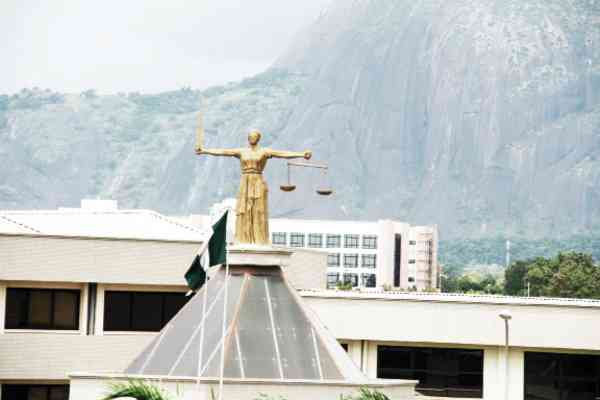A Federal High Court, sitting in Abuja, on Friday, refused to grant an application brought before it by a Lagos-based legal practitioner, Mr Olukoya Ogungbeje, praying for an order restraining President Muhammadu Buhari, the Department of State Service (DSS) and other respondents from re-arresting or taking any “untoward action” against five of the eight judges whose houses were raided by DSS operatives recently.
In a bench ruling delivered after Ogungbeje’s counsel, Mr Ayo Ogundele, moved the ex parte application, the trial judge, Justice Gabriel Kolawole held that he needed to resolve a number of issues including the legal right of the plaintiff in an inter-party hearing, before he could say anything on the prayer.
The plaintiff had sought, “An order of interim injunction restraining the respondents, their agents, servants, privies, men, officers or anybody deriving authority from them by whatever name called, from further arresting, intimidating, inviting, seizing or taking any untoward action against the arrested and affected honourable judges and judicial officers pending the hearing and determination of the substantive suit.”
The plaintiff had filed the ex parte application following his apprehension that the judges arrested in various parts of the country between October 7 and 8, 2016 could be charged and arraigned in court any time soon.
Rather than grant the prayer sought by Ogungbeje, Justice Kolawole directed that the motion on notice seeking similar prayer be served on the respondents and also ordered that five of the six respondents, President Buhari, Director-General of DSS, Lawal Daura; DSS; the Attorney-General of the Federation, Abubakar Malami; and the Inspector-General of Police, Ibrahim Idris, to appear in court on November 15, 2016 to show cause why the interim restraining order against further arrest of the judges should not be granted.
Joined as the sixth respondent to the suit is the National Judicial Council (NJC), even as the judge ordered that the plaintiff’s motion on notice be served on the respondents and they shall be entitled to respond within seven days of being served.
Ogungbeje had on October 14 filed the substantive suit seeking 10 prayers, among which is an order awarding N50 billion against the defendants as “general and exemplary damages.”
He also sought an award of N2 million as the cost of the suit and an order compelling DSS to return to the judges the sums of money recovered from them and a perpetual injunction restraining the defendants from arresting, inviting, intimidating, or harrassing the judges with respect to the case.
He alleged that the arrest of the judges without recourse to the NJC was unlawful and amounted to humiliating them, saying that the DSS operations violated the rights of judges under sections 33, 34, 35, 36, and 41 of the Constitution.
The DSS had, between October 7 and 8 arrested Justices Sylvester Ngwuta and John Okoro of the Supreme Court; Justice Adeniyi Ademola of the Federal High Court, Abuja and Justice Muazu Pindiga of the Federal High Court, Gombe Division.
Justice Nnnamdi Dimgba’s residence was also searched but he was not arrested, while others who were arrested had been placed on suspension by the NJC pending when President Buhari and their various state governors would approve its recommendation for their sacking.
They are a former Chief Judge of Enugu State, Justice I. A. Umezulike, the Presiding Justice of the Court of Appeal, Ilorin Division, Justice Mohammed Tsamiya; and judge of the Kano State High Court, Justice Kabiru Auta.
While all the seven of the judges arrested had since been released on self-recognition by DSS, Ogungbeje’s suit is restricted to five of the arrested judges who are still in active service, namely, Justices Ngwuta, Okoro, Ademola, Pindiga and Dimgba.
The plaintiff contended in his suit that the raid on the residences of the judges and their arrest was unconstitutional and that the arrest of the judges did not follow the law.

